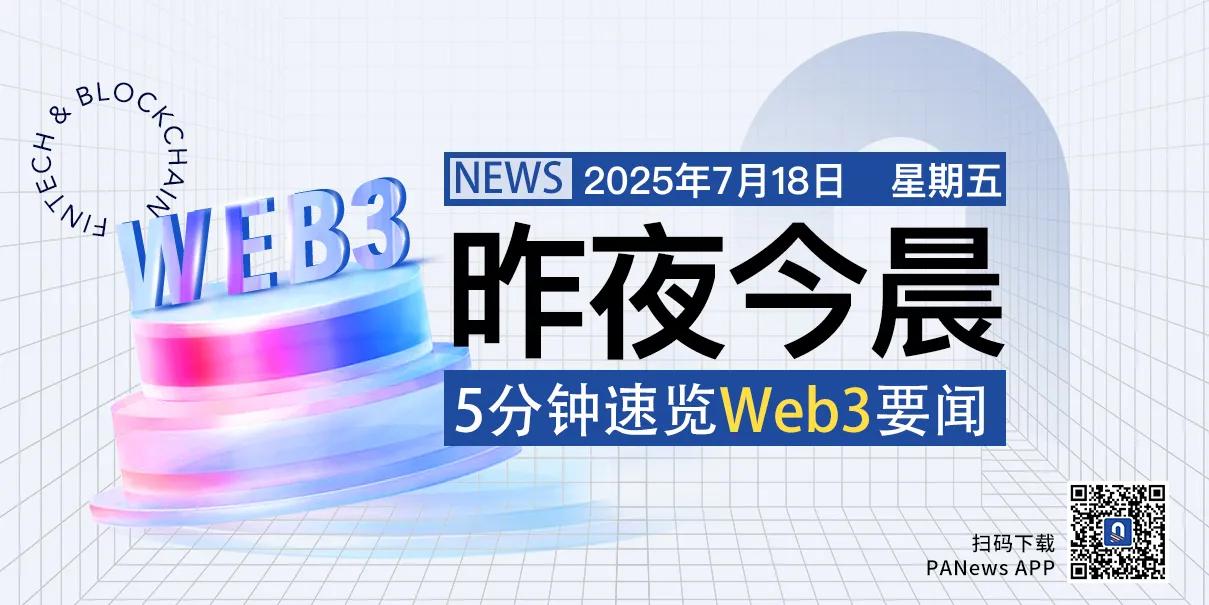
The China Industrial Internet Research Institute recently held a "Stablecoin and Industrial Digital Assets Symposium", focusing on core topics such as stablecoin policy regulation, industrial digital asset transformation, and RWA integration with the industrial internet. Representatives from the Information Technology Development Department of the Ministry of Industry and Information Technology provided guidance. Financial experts from companies like China Merchants Securities, SoftBank Asia Venture Capital, and Fosun Fortune International Holdings attended the meeting.
US SEC Considers Exemption Clauses for Crypto Innovation
According to Bloomberg, SEC Chairman Paul Atkins stated that the SEC is considering establishing regulatory exemptions for innovative projects to encourage tokenization development. This move comes after the US House of Representatives passed a landmark stablecoin bill. Atkins said the SEC is exploring ways to allow new transaction methods and more targeted regulatory exemptions to promote the tokenized securities ecosystem. He also noted that stablecoin legislation is an important step for the US to become a global crypto center.
[The translation continues in the same manner for the entire text, maintaining the specified translations for specific terms and preserving any HTML tags.]According to the Financial Times, U.S. President Trump is preparing to sign an executive order allowing 401k retirement plans to invest in alternative assets such as cryptocurrencies, gold, and private equity. This move will drive a major transformation in the $9 trillion U.S. retirement market. The executive order will instruct regulatory agencies to study and eliminate related barriers, providing 401k investors with more diverse asset options. The Trump administration had previously relaxed restrictions on cryptocurrency investments in retirement accounts and actively promoted related legislation.
ETH breaks through $3,500, with a daily increase of 2.56%
OKX market data shows that ETH has just broken through $3,500, currently trading at $3,507.63, with a daily increase of 2.56%.
According to The Block, blockchain-based travel platform Blockskye announced the completion of a $15.8 million Series C funding round, led by Blockchange, with participation from United Airlines Ventures, Lightspeed Faction, KSV Global, Lasagna, Litquidity Ventures, Longbrook Ventures, and TFJ Capital. The funding will be used to expand into European, Latin American, and Asian markets, and develop stablecoin-based real-time payment products. Blockskye directly connects with suppliers like airlines through blockchain technology, helping enterprise clients like PwC reduce travel costs. The company claims its platform can reduce travel expenses by 14.5% and save 84% on agency fees. Currently, the team has over 40 members and plans to add 30 new positions in technology and sales.
[The translation continues in the same manner for the remaining paragraphs, maintaining the specified translations for specific terms and preserving the structure of the original text.]Nasdaq-listed company Game Square Holdings announces plans to issue 46,666,667 common shares to raise $70 million, with the company planning to use these funds to enhance its ETH holdings. GameSquare CEO Justin Kenna revealed that the issuance includes a 15% over-allotment option, which could bring the total fundraising to approximately $80.5 million if fully exercised. The transaction is expected to be completed around July 18, 2025, subject to customary closing conditions.
Listed company Enlightify Inc. plans to purchase up to $20 million of CYBER tokens within 12 months
Cyber's official X platform stated: "The Cyber Foundation welcomes Enlightify Inc. (NYSE: ENFY) as the first listed company to commit treasury funds to CYBER tokens. Enlightify Inc. will purchase up to $20 million of CYBER tokens within 12 months."
Binance stated on its X platform that in response to user feedback on the Binance Alpha airdrop activity, the platform has initiated a series of optimization processes, including advance notifications and process simplification, aimed at improving user experience. They will continue to monitor and further optimize based on actual circumstances. Regarding community feedback about user violations in the Alpha airdrop activity, the platform has conducted strict screening and identification through multiple dimensions. Once violations are confirmed, immediate action will be taken against the involved accounts, with severe cases potentially facing permanent account bans.
[The rest of the translation follows the same approach, maintaining the structure and translating the content to English while preserving any specific names, tokens, or technical terms.]According to The Block, the tokenized money market fund platform Spiko has announced the completion of a $22 million Series A funding round, led by Index Ventures, with participation from institutions such as White Star Frst, Rerail, Bpifrance, and Blockwall, as well as angel investors including Revolut co-founder Nikolay Storonsky, Kyriba founder Jean-Luc Robert, Bridge co-founder Zach Abrams, Wise CTO Harsh Sinha, and Blackstone's co-chief investment officer Lionel Assant. Spiko focuses on providing tokenized money market fund services for European enterprises, allowing users to earn daily returns by investing in low-risk assets such as Eurozone and US Treasury bonds. The platform uses blockchain technologies like Ethereum and Arbitrum, and has already processed over $900 million in liquid funds. The company plans to collaborate with institutions like Memo Bank, with a goal of managing over $1 billion in assets by 2025.
According to PolkaWorld, at yesterday's Web3 Summit, Polkadot founder Gavin Wood pointed out that Polkadot's NPoS (Nominated Proof of Stake) is undermining its security model and needs fundamental replacement and reconstruction. Polkadot currently pays up to $500 million in annual security costs, primarily from Staking rewards, which constitute 85% of the network's annual inflation. These costs are realized by validators and nominators, flowing out of the ecosystem without converting to network usage or ecological activity. Gavin considers this a "unsustainable" fiscal structure that weakens network fiscal discipline and ecological incentive precision and efficiency. He proposed an alternative path of PoP (Proof of Personality), using "who you are" as the basis for on-chain power and trust. Gavin's solution includes: short-term reduction of 80% security expenses, such as setting fixed validator compensation, limiting self-staking and high return expectations, introducing a "stable issuance model" for DOT, raising validator thresholds, and introducing KYC and interview mechanisms; medium-term introduction of PoP and Individuality to launch an identity-driven security model; and supplementary tools to close invalid resources and introduce native stablecoins.
According to CoinDesk, the software company Strategy (MSTR), led by Michael Saylor and primarily focused on Bitcoin purchases, has set a new market capitalization record after years of transformation through aggressive equity issuance. The company's market value has soared to $128.5 billion, becoming the 84th largest listed company in the United States. Five years ago, the company's market value was less than $2 billion.
PANews reports on July 17th that according to Binance's official announcement, eligible users can claim 150 ERA tokens through Binance Alpha points after the launch. The airdrop will be distributed in two phases: the first phase (first 18 hours) allows users with at least 224 Alpha points to claim; the second phase (next 6 hours) allows users with at least 140 Alpha points to participate, on a first-come, first-served basis until the airdrop pool is depleted or the activity ends. Claiming the airdrop will consume 15 Binance Alpha points. Users must confirm the claim within 24 hours on the Alpha activity page, otherwise it will be considered forfeited.
According to on-chain analyst Yu Jin's monitoring, after recently purchasing ENA tokens, BitMEX co-founder Arthur Hayes appears to have bought ETH ecosystem tokens LDO and AAVE: he received $1 million worth of LDO and $1 million worth of AAVE from Flowdesk an hour ago (Yu Jin has updated this data, previously reporting $500,000 of LDO and $500,000 of AAVE). Additionally, his on-chain wallet has recently transferred out a significant amount of USDC, purchasing $6 million of ETH, $2 million of ENA, $1 million of LDO, and $1 million of AAVE and other ETH ecosystem tokens.
According to the official announcement, Binance Alpha will be the first platform to list Yooldo Games (ESPORTS) on July 19th. Eligible users can claim airdrops using Binance Alpha points on the Alpha activity page after trading opens. Specific details will be announced separately.
The voting page shows that the "WLFI Token Transferability Proposal" for Trump's crypto project World Liberty Financial (WLFI) has been voted through early this morning. The proposal aims to: enable WLFI token transferability through peer-to-peer transactions or secondary markets for broader community governance participation; transition the WLFI ecosystem from closed to open participation; enhance token utility and usage range; launch the next phase of community ownership and interaction; and align long-term token incentives with protocol adoption and success.
According to the official announcement, the Korean crypto exchange Upbit will list the ERA token on KRW, BTC, and USDT markets.
According to Cryptonews, Russian legislators have passed a digital ruble bill, with the central bank's digital currency expected to be introduced on September 1, 2026. Previously, the State Duma had passed a law for "gradual introduction" of the digital ruble, which will be reviewed by the upper house and then signed by President Putin, though these are largely formalities. The law sets the central bank's digital currency implementation timeline: from September 1, 2026, enterprises with annual income of 120 million rubles and above must provide services, with medium-sized enterprises given an additional year for compliance, and small and startup enterprises required to comply by September 1, 2028. Foreign banks and enterprises are also subject to these rules. The law also stipulates that goods and services payments will use digital ruble QR codes, with large enterprises obligated to provide payment options, while some small businesses may opt out, and merchants without network coverage or with annual income below 5 million rubles are not required to accept it.







